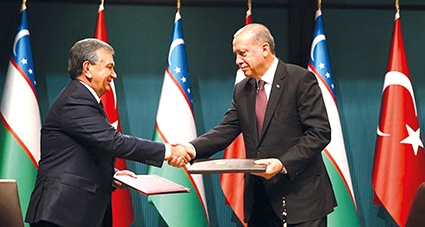One year of Mirziyoyev: Uzbekistan Looks Outwards
Following the death of Islam Karimov, who ruled Uzbekistan for almost 25 years, Shavkat Mirziyoyev won the presidential elections. He recently completed his first year in office. GEORGIA TODAY takes a look at what he achieved in this time.
In February 2017, Mirziyoyev approved the Development Strategy for 2017-2021 (covering a wide range of reforms in many areas). The most complete structural changes in Uzbekistan during this year occurred in the field of economy. Mirziyoyev initiated about 40 measures aimed at liberalizing the economy, the restrictions of which had been having a negative impact on the dominant role of the state.
Mirziyoyev abandoned the isolation policy pursued by Karimov and sought to improve relations with other Turkic republics. This is also evidenced by the fact that he made his first visit to Turkmenistan and that he devoted his main program of foreign visits to the leaders of the Turkic republics. Six times he met with the President of Kazakhstan, three times with the President of Turkmenistan and three times with the President of Kyrgyzstan. In addition, he also visited Turkey and held two meetings with the President of the Republic of Turkey, Recep Tayyip Erdogan, one of which was held in Uzbekistan
Uzbekistan's efforts to develop relations with neighboring countries offer new opportunities for regional cooperation. On November 10-11, 2017, the international conference ‘Security and Sustainable Development in Central Asia’ was held under the auspices of the United Nations in Samarkand. At this conference, it was decided to unite the leaders of the five Central Asian countries in Astana in 2018 before the Nevruz Summit. This expansion of cooperation between the Turkic republics may create conditions for the formation of an independent Turkestan agenda. In the near future, Uzbekistan could become a regional trading center due to its geopolitical location in relation to the other four countries of Central Asia.
In the first year of his presidency, Mirziyoyev also gave more freedom to his country’s media.
Specific steps were taken to abolish forced labor in agriculture, and, from January 1, 2019, exit visas are to be abolished in the country, without which the citizens of Uzbekistan cannot currently leave the country. In addition, Uzbekistan announced the introduction, from February 10 this year, of a visa-free regime for a period of 30 days for citizens of several countries, including Turkey.
Turkey was the first country to recognize the independence of Uzbekistan in 1991. For this reason, relations between the two countries have developed rapidly. Erdogan's statements about the “new page in relations” made during the meeting in Samarkand, and Mirziyoyev's words that “it's time for cooperation, not conversation,” have acquired an even deeper meaning.
Due to historical ties, Uzbekistan has always been a country whose attitude towards Turkey was something special. Bilateral cooperation between Turkey and Uzbekistan in the field of economy, security (mainly in the fight against terrorism), health care, tourism, production of textile and leather products, is also expected to develop rapidly.
The creation of joint universities in Uzbekistan, such as the Kazakh-Turkish University named after Ahmet Yasevi in Kazakhstan and the Turkish-Uzbek University named after Ulugbek, one campus in Istanbul and the other in Samarkand, can play a big role in applying the knowledge accumulated in Turkey and Uzbekistan in the region.
The period of Mirziyoyev's presidency seems to be a new stage for Uzbekistan. Karimov pursued a policy of distancing himself from the organizations of regional cooperation, especially the Turkic Council. The change in this policy can benefit both Uzbekistan and other players in the region. Uzbekistan has certain problems in terms of money and energy, and overcoming these problems will contribute to foreign investment and greater regional cooperation.
Dimitri Dolaberidze











